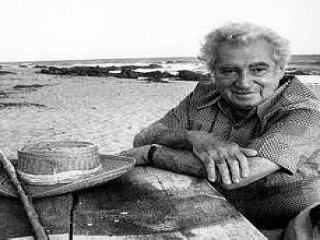
Jorge Amado biography
Date of birth : 1912-08-10
Date of death : 2001-08-06
Birthplace : Itabuna, Bahia, Brazil
Nationality : Brazilian
Category : Famous Figures
Last modified : 2011-08-10
Credited as : Writer, novelist, Juca Pato Prize
The Brazilian novelist Jorge Amado was best known in the 1930s for his novels of social protest. By the 1950s he had evolved into a compelling storyteller more apt to poke fun at the establishment than to denounce it. His lyricism, imagination, and humor have given him a worldwide reputation and following.
Jorge Amado was born on his father's cacao plantation along the eastern seaboard of Brazil, an area just then emerging from a period of violent struggles for land among the intrepid frontiersmen who opened it up. His novels are almost all set either in this region or in the city of Salvador (Bahia), where he was sent to secondary school. As a 16-year-old contributor to short-lived reviews, he began rebelling against the stuffiness of literary canons, an urge to which he gave further expression in his first halting novel, O pals do carnaval (1931; Carnival Country).
In law school in Rio de Janeiro, Amado became increasingly radicalized. Cacau (1933; Cocoa) was a proletarian novel set in the region of his childhood, and Suor (1934; Sweat) indicated both its aim and its earthy style by its title. In 1935 Amado was jailed; two years later he was exiled and many of his works were banned. He alienated the authorities still further by publishing in 1942 a biography of Luis Carlos Prestes, the charismatic leader of the Brazilian Communist party. After World War II, under a new political regime, Amado served as a Communist member of the Brazilian Chamber of Deputies until the party was outlawed in 1948. He won the Stalin International Peace Prize in 1951.
Subsequently, however, he ceased to take much active interest in political affairs. His later novels lost their preachy quality and became steadily less concerned with social protest. This new aspect can be seen in his first big literary success, The Violent Land (1943). It depicts the rough-and-tumble of frontier life but is neither just a "western" nor a radical pamphlet. This novel reveals careful attention to characterization, plot and style. A sequel was published 15 years later, Gabriela, Clove and Cinnamon. It offers an especially sharp contrast to his earlier work by its heightened sense of humor and by its concern with the individual caught up in the process of social change, rather than with the broad issues of social justice. Instead of caricatures there are now characters. In its details, the novel is a loving portrayal of the Brazilian lifestyle. It received wide acclaim, was translated into several languages and became a best seller in the United States.
From Dona Flor and Her Two Husbands (1966), Amado's best-known novel, through such late works as The War of the Saints (1988), his characters gained greater individuality in an often magic, realist, contemporary Bahia. The international success of these works (they've been translated into more than 30 languages) flows from Amado's keen sensitivity for human foibles and his ironic depiction of self-serving moralism, especially among those who seek to belittle others in order to give themselves false stature. His simple, almost poetic style, modeled on the ballad rhythms of the folk singer, helps give his novels an emotional intensity checked by his sardonic wit.
In addition to the Stalin International Peace Prize, Amado's honors include the Juca Pato Prize for "Intellectual of the Year" in 1970 from the Union of Brazilian writers. He was elected to the Brazilian Academy of Letters in 1961.
















